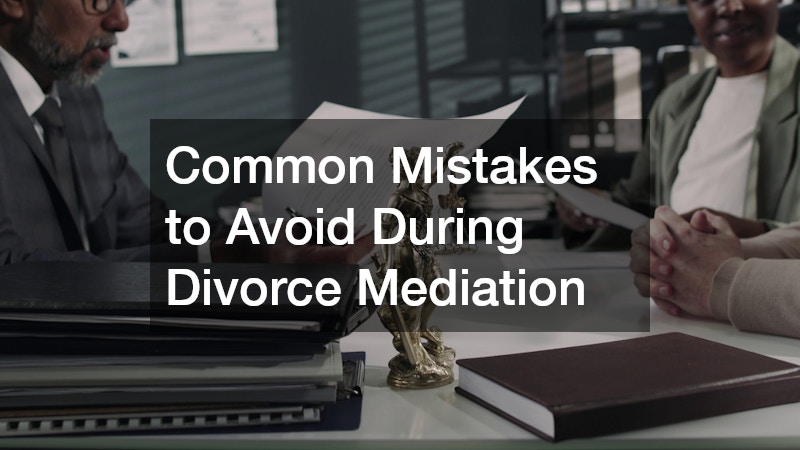
Key Takeaways
-
Preparing thoroughly with financial documents and clear priorities is essential for successful divorce mediation.
-
Managing emotions and staying solution-focused prevents impulsive decisions and communication breakdowns.
-
Consulting a divorce mediation attorney ensures legal rights are protected and agreements are enforceable.
-
Collaboration and compromise yield more durable, fair agreements than approaching mediation competitively.
-
Child-focused planning is crucial to create parenting schedules that support stability and well-being.
-
Understanding long-term financial implications, including taxes and support obligations, prevents future disputes.
Divorce can be one of the most stressful and legally complex experiences a person can face. Many couples immediately envision court battles, lengthy litigation, and spiraling legal fees. For those looking for a more cooperative approach, divorce mediation offers a way to resolve disputes in a structured, less adversarial environment. In divorce mediation, a neutral third-party mediator facilitates communication between spouses, helping them negotiate agreements on property division, financial matters, and child-related issues.
While divorce mediation can be faster, more private, and less expensive than traditional litigation, the process requires preparation, patience, and strategic participation. Many couples make avoidable mistakes that can stall proceedings, result in unfavorable agreements, or even create conflicts that end up in court anyway. Understanding these common pitfalls and how to avoid them is critical for anyone considering divorce mediation.
Understanding Divorce Mediation
Divorce mediation is a structured negotiation process that relies on cooperation and problem-solving rather than courtroom battles. A trained mediator helps spouses communicate, prioritize issues, and explore mutually beneficial solutions. Divorce mediation often involves attorneys, financial specialists, and child consultants, depending on the complexity of the case.
Participants in Divorce Mediation
-
Mediators: Neutral professionals trained to facilitate discussions, identify areas of agreement, and help parties communicate effectively.
-
Divorce attorneys: While mediation is not adversarial, consulting a family law attorney ensures that legal rights are protected and agreements comply with the law.
-
Financial specialists: Experts can assist with evaluating complex assets, investments, or retirement accounts, ensuring fair division.
-
Child consultants: Professionals focused on children’s emotional and developmental needs help design custody and parenting plans that prioritize stability.
Benefits of Divorce Mediation
-
Cost savings: Reduced legal fees compared to litigation.
-
Time efficiency: Fewer court appearances and flexible scheduling make the process faster.
-
Confidentiality: Unlike court hearings, mediation sessions are private, safeguarding sensitive information.
-
Greater control: Couples have direct input into decisions rather than leaving them to a judge.
-
Reduced conflict: A cooperative environment helps preserve relationships, which is especially important when children are involved.
Mistake 1: Entering Divorce Mediation Unprepared
Entering mediation without preparation is a common mistake that can derail progress. Some couples expect mediators to manage all aspects of the discussion or assume that agreements will naturally emerge during sessions. Failing to gather necessary information or clarify priorities can result in extended meetings, misinformed decisions, and frustration.
Consequences of Being Unprepared
-
Missed opportunities for fair settlements
-
Delays due to missing documentation
-
Overlooking critical financial, legal, or child-related details
How to Avoid This Mistake
-
Gather financial documents: Bank statements, tax returns, retirement accounts, and investment portfolios.
-
Compile property information: Real estate deeds, mortgage statements, vehicles, valuable personal property.
-
Document child-related matters: School records, medical information, extracurricular schedules, childcare costs.
-
Clarify goals: Determine your priorities in property division, custody arrangements, and support obligations.
-
Consult professionals: Review documents with a family law attorney or financial advisor to fully understand implications.
Preparation checklist for divorce mediation:
-
Bank and investment statements
-
Property deeds and mortgage documentation
-
Retirement accounts, pensions, and insurance policies
-
Tax returns, pay stubs, and other income records
-
Child-related records: school, health, and activity schedules
-
Written goals and priorities for settlement negotiations
Prepared participants can focus on negotiation rather than scrambling for information, leading to smoother and more effective mediation sessions.
Mistake 2: Letting Emotions Take Control
Divorce mediation can be emotionally charged. Letting anger, frustration, or resentment dictate decisions often leads to reactive choices that undermine fairness and prolong the process. Emotional volatility can derail discussions and make reaching agreements more difficult.
Consequences of Emotional Decisions
-
Impulsive or inequitable agreements
-
Breakdown in communication between spouses
-
Increased likelihood of returning to court to resolve disputes
Strategies for Emotional Management
-
Practice active listening: Focus on understanding your spouse’s perspective before responding.
-
Take breaks when necessary: Step away from the discussion if emotions are overwhelming.
-
Use “I” statements: Express needs without blaming your spouse.
-
Seek support: Counseling, coaching, or a child specialist can provide coping strategies.
-
Focus on problem-solving: Keep the discussion outcome-oriented rather than assigning blame.
Bullet points for emotional management in divorce mediation:
-
Pause sessions when discussions become heated
-
Avoid accusatory or inflammatory language
-
Bring a neutral support person if permitted
-
Consider pre-mediation coaching or therapy to prepare emotionally
Remaining calm and solution-focused increases the likelihood of productive discussions and fair agreements.
Mistake 3: Failing to Seek Legal Advice
Some individuals assume divorce mediation is informal and skip consulting a family law attorney. While mediation is designed to be collaborative, legal guidance is crucial for protecting rights, understanding complex laws, and avoiding mistakes that could have long-term consequences.
Consequences of Skipping Legal Guidance
-
Unintentionally giving up rights to property or support
-
Drafting agreements that are legally unenforceable or ambiguous
-
Overlooking long-term financial or tax implications
How to Avoid This Mistake
-
Hire a divorce mediation attorney: Even if you don’t litigate, an attorney can advise on legal obligations and review agreements.
-
Review draft agreements carefully: Attorneys can ensure clarity, enforceability, and compliance with state law.
-
Understand long-term consequences: Legal consultation clarifies retirement, tax, and support implications.
Bullet points for legal guidance in divorce mediation:
-
Confirm custody, support, and property rights
-
Verify enforceability and compliance with state laws
-
Assess long-term financial and tax implications
-
Ensure agreements reflect your best interests and protect rights
Legal input ensures mediation results are fair, valid, and sustainable.
Mistake 4: Treating Mediation as a Win-Loss Battle
Divorce mediation requires compromise and collaboration, but some participants approach it competitively, aiming to “win” at all costs. This mindset can stall negotiations, create tension, and increase stress for everyone involved.
Consequences of a Win-Loss Mentality
-
Deadlocked negotiations and stalled progress
-
Heightened conflict and emotional strain
-
Greater likelihood of litigation to resolve unresolved issues
Strategies for Effective Negotiation
-
Prioritize interests over positions: Focus on underlying needs rather than fixed demands.
-
Identify flexible areas: Determine what can be negotiated and what is non-negotiable.
-
Seek practical solutions: Aim for outcomes that meet both parties’ needs.
-
Consider children’s best interests: Decisions should support family stability rather than ego.
Bullet points for negotiation in divorce mediation:
-
List non-negotiable priorities and areas for compromise
-
Explore creative options for property division and custody arrangements
-
Avoid ultimatums, threats, or aggressive tactics
-
Maintain open communication and active listening throughout sessions
Approaching divorce mediation with collaboration rather than competition enhances efficiency and increases the likelihood of mutually satisfactory agreements.

Mistake 5: Neglecting Child-Focused Issues
Many parents focus primarily on financial settlements and property division, neglecting child custody, visitation, and co-parenting arrangements. Ignoring these aspects can lead to future disputes and negatively impact children’s well-being.
Consequences of Overlooking Child-Centered Issues
-
Inadequate parenting plans or schedules
-
Increased likelihood of conflict after mediation
-
Negative emotional impact on children
How to Avoid This Mistake
-
Address custody and parenting responsibilities: Discuss decision-making authority, visitation schedules, and communication.
-
Consider professional input: Child specialists or mediators can help ensure arrangements prioritize children’s needs.
-
Plan for flexibility: Children’s schedules and needs change over time, so agreements should allow for adjustments.
Bullet points for child-focused planning:
-
Develop a detailed parenting schedule for weekdays, weekends, and holidays
-
Plan for school events, extracurricular activities, and healthcare appointments
-
Establish clear communication protocols between parents
-
Consider financial responsibilities for education, medical care, and extracurriculars
Focusing on children ensures mediation agreements are durable, fair, and supportive of the entire family.
Mistake 6: Ignoring Financial Implications
Dividing assets without understanding the long-term financial consequences is a frequent mistake in divorce mediation. Failing to evaluate tax implications, retirement accounts, or debt responsibilities can create unexpected financial strain.
Consequences of Overlooking Financial Details
-
Tax penalties or unexpected liabilities
-
Unequal division of assets
-
Financial instability post-divorce
How to Avoid This Mistake
-
Engage a financial advisor: Professionals can provide insights into taxes, retirement, and long-term planning.
-
Understand long-term implications: Consider ongoing support obligations and future financial needs.
-
Document agreements carefully: Ensure clear, enforceable language regarding financial responsibilities.
Bullet points for financial planning in divorce mediation:
-
Analyze property division for tax consequences
-
Account for retirement accounts, pensions, and investments
-
Plan for child and spousal support obligations
-
Consider long-term financial stability for both parties
Proper financial planning helps couples avoid surprises and ensures agreements are equitable.
Mistake 7: Rushing the Process
Some couples attempt to expedite divorce mediation to reduce costs or end emotional stress quickly. Rushing can result in incomplete agreements, overlooked issues, or poorly considered decisions.
Consequences of Rushing
-
Mistakes or omissions in agreements
-
Increased potential for future disputes
-
Overlooked long-term considerations
How to Avoid This Mistake
-
Take sufficient time: Schedule multiple sessions if needed.
-
Review all proposals carefully: Avoid signing documents under pressure.
-
Consult professionals: Attorneys, financial advisors, and child specialists can help evaluate the implications of decisions.
Bullet points to prevent rushing:
-
Schedule multiple mediation sessions when necessary
-
Review all documents thoroughly before signing
-
Seek clarifications from mediators or attorneys
-
Avoid making decisions under emotional stress
A deliberate approach ensures that all matters are addressed and agreements are sustainable.
Divorce mediation is a powerful tool for couples seeking a fair, cooperative, and efficient divorce process. Avoiding common mistakes—such as entering unprepared, letting emotions dominate, ignoring legal advice, approaching mediation competitively, neglecting child-centered concerns, overlooking financial implications, and rushing the process—significantly increases the likelihood of successful outcomes.
By approaching divorce mediation strategically, couples can achieve agreements that protect their rights, preserve family relationships, and provide stability for children. When executed thoughtfully, divorce mediation can reduce conflict, save time and money, and result in solutions that both parties can live with long-term.


